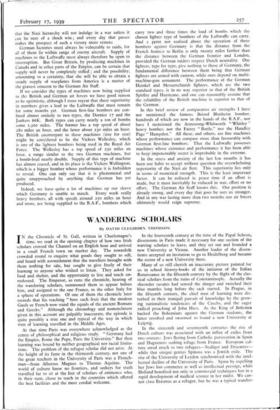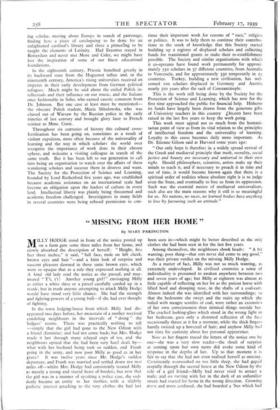WANDERING SCHOLARS
By DAVID CLEGHORN THOMSON
IN the Chronicle of St. Gall, written in Charlemagne's time, we read in the opening chapter of how two Irish scholars crossed the Channel on an English boat and arrived in a small French town on market day. The townsfolk crowded round to enquire what goods they sought to sell, and heard with astonishment that the travellers brought with them nothing for sale, but sought to give freely of their learning to anyone who wished to listen. They asked for food and shelter, and the opportunity to live and teach =- molested. The Emperor, so runs the chronicle, hearing of the wandering scholars, summoned them to appear before him, and assigned to the one France, to the other Italy for a sphere of operations. Of one of them the chronicle later records that his teaching " bore such fruit that the modem Gauls or French now stand the equals of the ancient Romans and Greeks." Although the chronology and nomenclature given in this account are palpably inaccurate, the episode is quite possibly a true one and typical of the way in which men of learning travelled in the Middle Ages.
At that time Paris was everywhere acknowledged as the centre of philosophical and religious study. " Germany had the Empire, Rome the Pope, Paris the University." But then learning was bound by neither geographical nor racial limita- tions. The problem of the refugee scholar did not arise. At the height of its fame in the thirteenth century, not one of the great teachers in the University of Paris was a French- man—from Albertus Magnus to Thomas Aquinas. The world of culture knew no frontiers, and seekers for truth travelled far to sit at the feet of scholars of eminence who, in their turn, chose to teach in the countries which offered the best facilities and the most cordial welcome. In the fourteenth century at the time of the Papal Schism, ' dissensions in Paris made it necessary for one section of the warring scholars to leave, and they set out and founded a new University at Vienna. Another leader of the dissen- tients accepted an invitation to go to Heidelberg and became the rector of a new University there.
Many of us still cherish an inaccurate picture painted for us in school history-books of the initiaton of the Italian Renaissance in the fifteenth century by the flight of the clas- sical scholars from the ruins of Constantinople. Actually the shrewder savants had sensed the danger and twitched their blue mantles long before the sack started. In Prague, in the fifteenth century, the chief men of learning were dis- turbed in their tranquil pursuit of knowledge by the grow- ing nationalistic tendencies of the Czechs, and the eager radical preaching of John Huss. As the King of Bohemia backed the Bohemians against the German students, the latter revolted and swarmed to found a new University at Leipzig.
In the sixteenth and seventeenth centuries the rise of Dutch culture was associated with an influx of exiles from two sources: Jews fleeing from Catholic persecution in Spain and Huguenots seeking refuge from France. European cul- ture owed much to two refugees—Scaliger and Descartes— while that unique genius Spinosa was a Jewish exile. The rise of the University of Leyden synchronised with the intel- lectual decline of the University of Paris. Spain by expelling her Jews lost commerce as well as intellectual prestige, while Holland benefited not only in commercial techniques but in a rapid development of medical science in her midst. We can- not class Erasmus as a refugee, but he was a typical wander- ing scholar, moving about Europe in search of patronage, finding here a piece of cataloguing to be done for an enlightened cardinal's library and there a princeling to be taught the elements of Latinity. Had Erasmus stayed in Rotterdam and never met More and Colet, we might have lost the inspiration of some of our finest educational foundations.
In the eighteenth century, Prussia benefited greatly in its backward state from the Huguenot influx and, in the nineteenth century, America's rising universities received an impetus in their early development from German political refugees. Much might be said about the exiled Polish in- tellectuals and their influence on our music, and the Italians once fashionable in Soho, who earned caustic comment from Dr. Johnson. But one case at least must be mentioned— the obscure Polish student, Maria Sklodowska, who was chased out of Warsaw by the Russian police in the early nineties of last century and brought glory later to French science as Mme. Curie.
Throughout six centuries of history this cultural cross- fertilisation has been going on, sometimes as a result of violent expulsion, more often because of the universality of learning and the way in which scholars the world over recognise the importance of work done in their chosen sphere, and welcome a visiting colleague in search of the same truth. But it has been left to our generation to call into being an organisation to watch over the affairs of these wandering scholars and succour them in distress and want. The Society for the Protection of Science and Learning, founded by Lord Rutherford five years ago, was established because academic assistance on an international scale had become an obligation upon the leaders of culture in every land. Intellectual liberty was plainly being threatened and academic freedom challenged. Investigators in many fields in several countries were being refused permission to con- tinue their important work for reasons of " race," religio:1 or politics. It was to help them to continue their contribu- tions to the stock of knowledge that this Society started building up a register of displaced scholars and collecting funds for transitional grants to make their re-establishment possible. The Society and similar organisations with which it co-operates have found work permanently for approxi- mately 55o scholars in 37 different countries, from Australia to Venezuela, and for approximately 33o temporarily in 25 countries. Turkey, building a new civilisation, has wel- comed too scholars displaced in Germany and Austria nearly 500 years after the sack of Constantinople.
This is the work still being done by the Society for the Protection of Science and Learning, which has now for the first time approached the public for financial help. Hitherto its funds have largely been drawn from the generous gifts of Univeristy teachers in this country £80,000 have been raised in the last five years to keep the work going.
This work must appeal not so much from the humani- tarian point of view as from its vital relation to the principles of intellectual freedom and the universality of learning. Loyalty to this cause becomes daily more important. As Dr. Etienne Gilson said at Harvard some years ago: " Our only hope is therefore in a widely spread revival of the Greek and mediaeval principle that truth, morality, social justice and beauty are necessary and universal in their own right. Should philosophers, scientists, artists make up their minds to teach it, and if necessary to preach it in time and out of time, it would become known again that there is a spiritual order of realities whose absolute right it is to judge even the State, and eventually to free us from its oppression. Such was the essential nature of mediaeval universalism; such also are the main reasons why it still is so meaningful for us. No nations, no races, no learned bodies have anything to lose by favouring such an attitude."











































 Previous page
Previous page